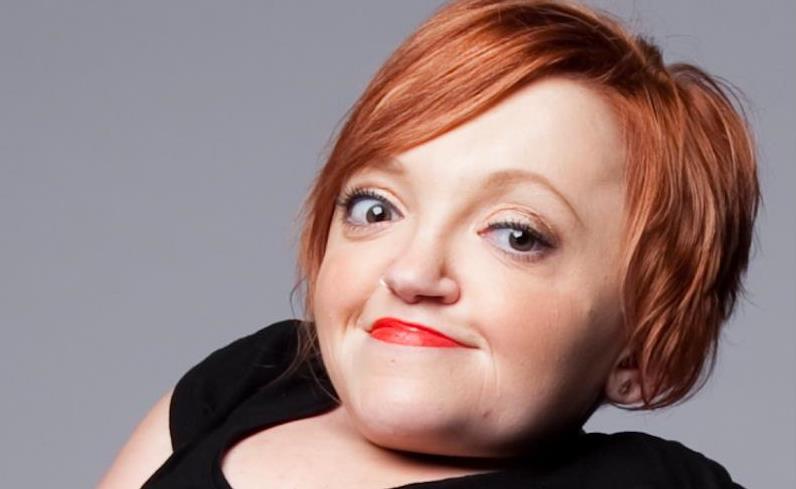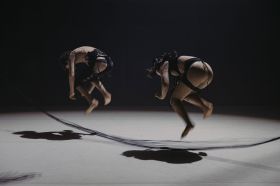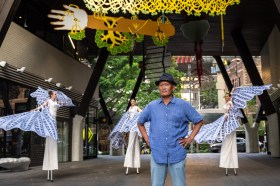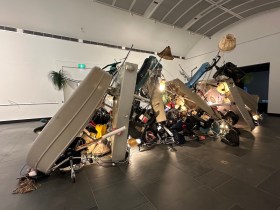Covid-19 has led to the creative arts industry experiencing project setback after setback, as well as been an isolating and stress-inducing time for the disability community.
Before pandemic restrictions hit, job security was already not a sure guarantee for young emerging disabled creatives. Anyone who has tried to get an art project up on its hind legs will know how hard it is. There are more applicants than there are available funds, access issues for people with disabilities wanting to apply for funding in an ever-shrinking job pool which favours more established and prestigious art-makers.
After months of financial uncertainty for the arts sector, the government announced its $75 million Restart Investment to Sustain and Expand (RISE) Fund. RISE grant application guidelines have only just been released. It will be almost a year before artists will be able to access any funding and the application guidelines do not provide any assistance for artists with disabilities who may wish to apply.
We are yet to grasp the scale of the consequences to diversity in the arts because of COVID-19. It will be a cause for concern if disabled artists are unable to secure employment, venues, theatre company backing or funding after the pandemic because their projects were flatlined by it.
While it is nice to think that being confined to our homes is the perfect opportunity for more art-making, we know from survey results from People with Disabilities Australia that our community is struggling to get their basic needs met because of COVID-19 restrictions. 91% said daily living expenses had increased while 46.3% said they were receiving less support. These are hardly the conditions which allow a person time to focus on creative projects.
As artists – disabled or not – the combined stressors of having to be constantly churning out original art while ensuring you’re meeting your own economic needs can mean who gets to ‘make it’ is determined more so on who has been taking up space the longest and can financially afford to be.
Many young disabled creatives are in insecure employment and housing. It’s disheartening to see how this can dictate who can survive in the arts industry and how COVID-19 may further lessen the opportunities for disabled artists.
Arts Access Victoria has recently announced the 2020 Stella Young Award for a young Australian disabled artist. Winning the Stella Young Award last year helped me build my confidence. In 2019, I was new to theatre-making and based on what I was observing, my chances of ever being seriously considered for roles in productions, theatre companies and the media industry were slim to none, unless I was the one spearheading them.
While I couldn’t expect issues of access to have disappeared in a year, and they might not ever, winning the Stella Young Award put me in a stronger position to attract the support of more established creatives who were more receptive to my ideas and the story I wanted to tell in my play Breeders.
After hearing I was the winner of the Stella Young award, that Arts Access Victoria were willing to support me and they thought I was someone whose values would have aligned with Stella’s (the biggest compliment above all from winning), I felt I had more of a foot in the door in theatre. Whereas before, I was hesitant to develop working relationships with artists I admired.
Discussing the value of winning this award would not be complete without mentioning the legacy, wit and incisiveness of Stella herself. Stella dealt with confronting and polarising disability issues in a way that was forthright and drew on her own personal history of experiencing discrimination. Her sincerity and perceptivity allowed her to cut through less explicit forms of ableism.
Stella has shaped how I think about being disabled; I’m not as self-punishing for the things I struggle with anymore because of her writings on the social model of disability.
Stella’s criticism of Peter Singer’s utilitarian ethics in his book, Should the Baby Live? is why my play Breeders challenges his advocacy for parents of disabled babies to be able to have the decision available to them to authorise doctors to kill their child during its first week of life.
Breeders is my first full length play – surreal, comedic, and about a lower-class Melbourne autistic family, situated against broader social debates such as the anti-vaccination movement and parenting children with disabilities.
Breeders deals with some intense, heavy and morbid content which has brought with it a host of issues in terms of actor welfare and audience safety, which is why the Stella Young Award money will be put towards financing the play and ensuring my cast of neurodivergent, disabled, queer and people of colour identifying cast can be paid for their contributions to the work and have their access requirements catered for.
After I received the 2019 Stella Young Award last year, I was able to undertake a period of script development. However it would be an understatement to say COVID-19 has set us back. Breeders was supposed to have just finished its first season at La Mama Theatre in July of this year. Unfortunately, because of the pandemic, we have only been able to do online play readings for the development.
My director, Emma Hall (creator of We May Have to Choose, World Problems, Ode to Man) and I are now just waiting for the time when restrictions will ease and it will be safe and legal to get into a rehearsal room.
It is worth noting that my play, which is made up primarily of disabled creatives still managed to progress with a pandemic going on. This in itself has highlighted to me that the lack of diversity in theatre and media in no way indicates that there aren’t professional, high-quality and committed disabled creatives in our community… That it’s undoubtedly the usual suspect: the collective failure of arts’ organisations to pay more focused attention to who sits on their boards, as directors or producers, to critically assess whose plays are getting seasons and the backgrounds of who wrote them.
The Stella Young Award is an opportunity to celebrate a disabled art maker during what has been a challenging year for our community. For the next Stella Young Award recipient, it might feel undeserved; imposter syndrome is common in people from marginalised groups. If this feels like the case for you, remember that decisions are made every day in the arts industry where questions of access and diversity aren’t even registered as an afterthought. You just existing as a disabled art maker is commendable in itself. You deserve to be thought about and to have your art thought about. Here is hoping the theatre community has a better stroke of luck in 2021.
Nominations for the 2020 Stella Young Award close 14 September.






